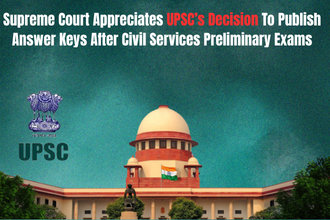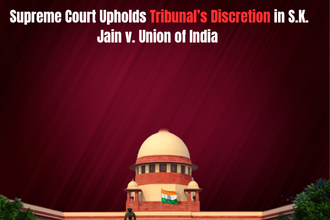In a major development aimed at enhancing transparency in India’s most prestigious competitive exam, the Supreme Court of India has appreciated the Union Public Service Commission (UPSC) for its decision to publish the answer keys of the Civil Services Preliminary Examination (CSE Prelims) soon after the test is conducted.
The decision, hailed as a policy shift, was revealed in a recent affidavit filed by the UPSC in response to a writ petition filed in 2024. The petition sought greater transparency in the Civil Services Examination process, particularly in the disclosure of marks and answer keys. The Supreme Court bench comprising Justice P.S. Narasimha and Justice A.S. Chandurkar commended the UPSC’s proactive stance and acknowledged the constructive role played by Senior Advocate and Amicus Curiae Jaideep Gupta in suggesting this reform.
Background: Petition for Transparency in UPSC Examinations
The case, titled Himanshu Kumar v. Union of India [W.P.(C) No. 118/2024, Diary No. 5468/2024], arose from concerns that the UPSC’s previous practice of releasing marks, cut-off scores, and answer keys only after the entire CSE process was over—including the final results—was opaque and unfair to candidates.
The petitioners, represented by Senior Advocate Kapil Sibal, argued that when questions in the prelims were ambiguous or incorrect, candidates were left without an immediate avenue for redressal. By the time answer keys were published months later, the opportunity to challenge errors had passed, causing many aspirants to lose valuable years.
Court Appreciates UPSC and Amicus for ‘Participatory Adversarialism’
At the hearing, the bench lauded the UPSC’s decision and expressed satisfaction over the evolution of the examination policy. Justice Narasimha remarked,
“We read somewhere about this proposal in the newspapers and realized it came from you [Amicus Jaideep Gupta]. Your proposal was excellent—participatory adversarialism.”
This comment underscored the Court’s recognition of collaborative judicial engagement, where suggestions from amici curiae contribute meaningfully to policy reform beyond mere adjudication.
The Court also observed that while petitions like this often begin as grievances seeking relief, they ultimately serve to develop the law by encouraging systemic changes that benefit all stakeholders.
Shift in UPSC Policy: From Opposition to Acceptance
Initially, in its May 15, 2024 affidavit, the UPSC had opposed the proposal to release answer keys soon after the prelims. It argued that such disclosure could be “counter-productive,” leading to “uncertainty” and “delays in finalizing the examination process.”
However, following detailed discussions and the amicus’ submissions, the UPSC reconsidered its position. In a subsequent affidavit filed in September 2025, it announced that it would publish the provisional answer keys soon after the prelims—a move welcomed by the Court and aspirants alike.
This reversal marks a significant policy shift in the UPSC’s approach to examination transparency, aligning it more closely with global standards of public accountability in competitive assessments.
What the New Policy Means for Candidates
Under the revised UPSC procedure:
- Provisional Answer Keys will be released soon after the Civil Services Preliminary Examination.
- Candidates can submit objections or representations against any question or answer, provided these are supported by at least three authoritative sources (e.g., standard textbooks, government documents, or recognized reference materials).
- The representations will be reviewed by a panel of subject experts, who will evaluate the objections and finalize the answer keys.
- These finalized keys will form the basis for evaluating prelims results.
- Finally, after the complete examination cycle, including the mains and interview stages, the final answer keys will be published publicly for transparency and future reference.
The UPSC has also committed to implement the policy expeditiously, assuring the Court that this system will adequately address the grievances raised by the petitioners.
Reliefs and Observations in Court
During the hearing, Kapil Sibal highlighted that many candidates suffer due to erroneous questions and lack of transparency. He argued that such aspirants should be given another chance to appear in subsequent examinations, especially when they lose out due to mistakes in the question paper.
Responding to this, Amicus Curiae Jaideep Gupta suggested that if any question or answer is later found to be incorrect, the Court could mould relief to protect affected candidates without disrupting the entire examination process. For instance, such candidates could be allowed to appear for the mains exam in the following year.
However, the UPSC did not accept this specific suggestion, stating that it acts only as an exam-conducting body, while policy rules are framed by the Department of Personnel and Training (DoPT). The UPSC’s counsel also suggested that the matter could be referred to the Central Administrative Tribunal (CAT), but the Court instead allowed the petitioners to approach the concerned High Court for relief.
The bench disposed of the writ petition, granting liberty to the petitioners to seek remedies before appropriate judicial forums, and allowed them to make simultaneous representations to the authorities.
Significance of the Decision
The Supreme Court’s appreciation of UPSC’s reform represents a paradigm shift in examination governance. By introducing a structured mechanism for objections and early disclosure of answer keys, the decision enhances:
- Transparency in the evaluation process
- Accountability of examination authorities
- Trust among lakhs of UPSC aspirants
- Fairness in dealing with errors and ambiguities in question papers
This move is also expected to reduce unnecessary litigation, as candidates will have an immediate opportunity to challenge inaccuracies rather than waiting until final results are published.
Moreover, it signals the Supreme Court’s continued emphasis on institutional evolution through dialogue and participation, setting an example for other national-level examining bodies like SSC, CBSE, and UGC-NET to adopt similar transparent practices.
Conclusion
The Supreme Court’s acknowledgment of the UPSC’s proactive decision is a milestone in the evolution of India’s examination system. It balances administrative efficiency with candidates’ right to transparency and fairness.
Through judicial dialogue, amicus intervention, and institutional responsiveness, the process exemplifies how legal advocacy can bring about constructive administrative reform.
As India’s bureaucracy continues to attract millions of aspirants each year, this policy will not only build trust in the UPSC’s examination process but also ensure that future officers are selected through a more transparent, accountable, and fair system—a true reflection of constitutional values in public service recruitment.
Also Read
Sharjeel Imam Withdraws Plea Seeking Interim Bail to Contest Bihar Assembly Elections
Supreme Court Seeks Finance Ministry’s Views on Sahara Group Plea to Sell 88 Properties to Adani



